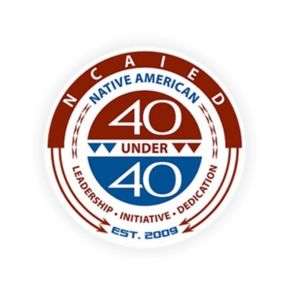The National Center for American Indian Enterprise Development announced this year’s class of Native American 40 Under 40 Award honorees. This is the award’s sixteenth year.

Awardees, who are nominated by their peers, are chosen based on their leadership, initiative, and dedication and have made significant contributions to their professions and communities. The 2025 40 Under 40 Awardees will be honored at this year’s Reservation Economic Summit (RES) taking place at Caesars Palace Hotel and Casino, Las Vegas, NV from March 10–13, 2025.
“Each of these remarkable individuals has shown a commitment to going beyond boundaries to build a bright future for Indian Country,” Chris James (Cherokee), president and CEO of The National Center. “They join more than 600 past honorees in what has been an increasingly tight-knit and collaborative group. I’m excited to celebrate the 2025 class’s achievements at RES 2025 and follow their success in the years ahead.”
2025 Honorees Are:
Stephen Bell, Lumbee Tribe of North Carolina; Greensboro, NC
Jackie Boyd, Choctaw Nation of Oklahoma; Durant, OK
Colin Bradley, Navajo Nation; Phoenix, AZ
Patrick Burtt, Washoe Tribe of Nevada and California; Gardnerville, NV
Allen Cadreau, Sault Ste. Marie Tribe of Chippewa Indians; Anaheim Hills, CA
Jacob Crane, Tsuu'tina First Nation; Midvale, UT
Lindsey Dollman, Pechanga Band of Indians; Temecula, CA
Jarred-Michael Erickson, Confederated Tribes of the Colville Reservation; Nespelem, WA
Steven Estrada, Santa Rosa Band of Cahuilla Indians; San Jacinto, CA
Meghan Francis, Confederated Tribes of the Colville Reservation; Nespelem, WA
Christopher Franklin, Miwok; Elk Grove, CA
Candace French, Wichita and Affiliated Tribes/Navajo Nation; Scottsdale, AZ
Bryce Fugate, Osage Nation; Denver, CO
Vivian Garcia, Cherokee Nation; Los Angeles, CA
Sabrina Grubitz, Tlingit and Haida Indian Tribes of Alaska; Juneau, AK
Zechariah Harjo, Muscogee (Creek) Nation; Norman, OK
Dustin Harjo, Seminole Nation of Oklahoma; Muskogee, OK
Chelsea Healy, Kainai (Blood Tribe) First Nation; Santa Monica, CA
Steven Hollabaugh, Cherokee Nation; Broken Arrow, OK
Sean Lawrence, Lummi Nation; Bellingham, WA
Jacob Marcellay, Spokane Tribe of Indians; Wellpinit, WA
John Morseau, Pokagon Band of Potawatomi; Minneapolis, MN
Travis Owens, Cherokee Nation; Catoosa, OK
Alena Pastores, Fort Yuma Quechan Indian Tribe; Riverside, CA
Rose Petoskey, Grand Traverse Band of Ottawa and Chippewa Indians; Washington, DC
Adrian Standing-Elk Pinnecoose, Navajo Nation/Southern Ute; Albuquerque, NM
Ryan Pulvermacher, Ho-Chunk Nation; Madison, WI
Taryn Reynolds, Osage Nation; Pawhuska, OK
Joshua Riley, Choctaw Nation of Oklahoma; Durant, OK
Jessica Roberts, Cherokee Nation; Seattle, WA
Kameron Runnels, Santee Sioux Nation; Niobrara, NE
Savana Saubel, Agua Caliente Band of Cahuilla Indians; Palm Springs, CA
Jude Schimmel, Confederated Tribes of the Umatilla Indian Reservation; Pendleton, OR
Jeremy Takala, Confederated Tribes and Bands of the Yakama Nation; Toppenish, WA
Tyler Thomas, Lumbee Tribe of North Carolina; Pembroke, NC
Brian Wadsworth, Pyramid Lake Paiute Tribe; Nixon, NV
Madeline Walker, Prairie Band Potawatomi Nation; Orlando, FL
Lawrence Wheeler, Cherokee Nation; Marlow, OK
Sarah White, Oglala Lakota; Black Hawk, SD
Nicholas Woodruff, Cherokee Nation; Houston, TX
More Stories Like This
Native News Weekly (August 25, 2024): D.C. BriefsUS Presidents in Their Own Words Concerning American Indians
Indigenous Actor Elaine Miles Reports Detention by Alleged ICE Agents
Happy Thanksgiving from Native News Online
Coming Up on Native Bidaské: Behind the Animation: Joey Clift Talks “Pow” and Native Storytelling
Help us tell the stories that could save Native languages and food traditions
At a critical moment for Indian Country, Native News Online is embarking on our most ambitious reporting project yet: "Cultivating Culture," a three-year investigation into two forces shaping Native community survival—food sovereignty and language revitalization.
The devastating impact of COVID-19 accelerated the loss of Native elders and with them, irreplaceable cultural knowledge. Yet across tribal communities, innovative leaders are fighting back, reclaiming traditional food systems and breathing new life into Native languages. These aren't just cultural preservation efforts—they're powerful pathways to community health, healing, and resilience.
Our dedicated reporting team will spend three years documenting these stories through on-the-ground reporting in 18 tribal communities, producing over 200 in-depth stories, 18 podcast episodes, and multimedia content that amplifies Indigenous voices. We'll show policymakers, funders, and allies how cultural restoration directly impacts physical and mental wellness while celebrating successful models of sovereignty and self-determination.
This isn't corporate media parachuting into Indian Country for a quick story. This is sustained, relationship-based journalism by Native reporters who understand these communities. It's "Warrior Journalism"—fearless reporting that serves the 5.5 million readers who depend on us for news that mainstream media often ignores.
We need your help right now. While we've secured partial funding, we're still $450,000 short of our three-year budget. Our immediate goal is $25,000 this month to keep this critical work moving forward—funding reporter salaries, travel to remote communities, photography, and the deep reporting these stories deserve.
Every dollar directly supports Indigenous journalists telling Indigenous stories. Whether it's $5 or $50, your contribution ensures these vital narratives of resilience, innovation, and hope don't disappear into silence.
 The stakes couldn't be higher. Native languages are being lost at an alarming rate. Food insecurity plagues many tribal communities. But solutions are emerging, and these stories need to be told.
The stakes couldn't be higher. Native languages are being lost at an alarming rate. Food insecurity plagues many tribal communities. But solutions are emerging, and these stories need to be told.
Support independent Native journalism. Fund the stories that matter.
Levi Rickert (Potawatomi), Editor & Publisher

